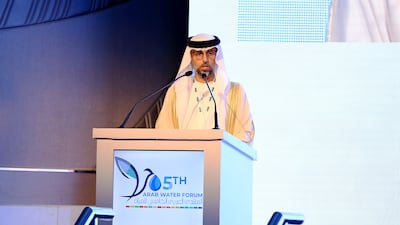The UAE is developing three new water desalination projects to help boost sustainability and achieve water security goals.
They will be developed in Abu Dhabi, Dubai and Umm Al Quwain, with a combined capacity of 420 million imperial gallons of water per day, Minister of Energy and Infrastructure Suhail Al Mazrouei said at the fifth Arab Water Forum in Dubai on Tuesday.
Once commissioned in 2023, the projects will increase the installed water desalination capacity of the Arab world's second-largest economy to 1,590 million imperial gallons per day and will help the country overcome the challenges of water scarcity in future under its UAE Water Security Strategy 2036, he said.
“Water is an essential pillar of sustainability, which makes it a strategic priority of the UAE where three desalination plants … will be commissioned by 2023,” Mr Al Mazrouei said in his speech.
The water sector “is of vital importance to sustainable development, and a factor central to achieving the social, economic and environmental goals and objectives associated with the 2030 Sustainable Development Goals”, he added.
Food and water security are among the top priorities for UAE government. The region heavily relies on the food imports and depends on desalination for a bulk of its potable water needs.
The UAE launched its 2036 water security strategy in 2017, which is focused on the entire UAE’s water supply chain with a priority for strategic production of water resources, storage, transport networks and interconnectivity among the seven emirates.
It focuses on ensuing sustainable access to water during both normal and emergency conditions in line with World Health Organisation standards.
The strategy aims to reduce total demand for water resources by 21 per cent, boost the water productivity index to $110 per cubic metre, reduce the water scarcity index by three degrees, increase the reuse of treated water to 95 per cent and increase national water storage capacity by up to two days.
As well as desalination, the UAE is looking at other greener options such as atmospheric water generation, or AWG, to supplement clean drinking water in homes and institutions. AWG technology, which produces drinking water directly from air by condensing the water molecules below dew point, is being increasingly used in arid environments.
In August, US-based technology company Aquovum said it will start a pilot project at Abu Dhabi's Masdar City as part of the UAE's efforts to produce clean water in a more sustainable way.
Aquovum will produce commercial volumes of uninterrupted water supply using solar and thermal energy in partnership with UAE clean energy company Masdar and the Khalifa University of Science and Technology. The project is part of a three-party research and development agreement between the entities.
On Tuesday, Mr Al Mazrouei said the UAE has made “qualitative contributions” and has disbursed nearly Dh3 billion ($817.43 million) in aid since 2015 to provide water and sanitation-related related development assistance.
“The water-related challenges will become more tough in light of the growing demand for water and the scarcity of resources, especially in our Arab region in the coming years,” he told the forum.
“The worsening global climate change and the increase in future demand for water have forced us to undertake more initiatives, dialogue, reflection and joint work to build future capabilities to meet these challenges and overcome.”
The UAE will remain committed and will continue efforts to “enhance regional and international co-operation in water-related activities and programmes”, he added.


